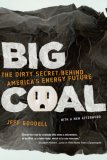Summary | Excerpt | Reading Guide | Reviews | Beyond the Book | Readalikes | Genres & Themes | Author Bio

Critics' Opinion:
Readers' Opinion:
First Published:
Jun 2006, 352 pages
Paperback:
Apr 2007, 352 pages
 Book Reviewed by:
Book Reviewed by:
BookBrowse Review Team
Buy This Book
America’s great bounty of coal confers upon the United States
many economic and political advantages. As a purely practical matter, it
means that America will not go dark while scientists search for a
replacement for fossil fuels. If the world becomes energy-starved, our
reserves mean that America will have a source of fuel to keep our factories
running and our cities well lit. If oil supplies collapse and prices skyrocket,
we can begin a crash program to build coal liquefaction plants, which can
turn coal into synthetic diesel. It won’t keep our SUVs rolling, but it might
help keep our F-16s flying. Using a similar process, coal can also be
transformed into synthetic natural gas, fertilizers, and a variety of industrial
chemicals.
But this great bounty of coal is also a great liability. It means that
America has a big incentive to drag out the inevitable transition to cleaner,
more modern forms of energy generation. In a world that is moving toward
energy efficiency, coal is a big loser. Alternative energy guru Amory Lovins
estimates that by the time you mine the coal, haul it to the power plant, burn
it, and then send the electricity out over the wires to the incandescent bulb in
your home, only about 3 percent of the energy contained in a ton of coal is
transformed into light. In fact, just the energy wasted by coal plants in
America would be enough to power the entire Japanese economy. In effect,
America’s vast reserve of coal is like a giant carbon anchor slowing down the
nation’s transition to new sources of energy. And because coal is the dirtiest
and most carbon-intensive of all fossil fuels—coal plants are responsible for
nearly 40 percent of U.S. emissions of carbon dioxide, the main greenhouse
gas—a commitment to coal is tantamount to a denial of a whole host of
environmental and public health issues, including global warming. When
you’re sitting on top of 250 years’ worth of coal, an international agreement to
limit carbon dioxide emissions, such as the Kyoto Protocol, is easily seen
as a crude attempt by jealous competitors to blunt one of America’s great
strategic and economic advantages.
In America, the story of coal’s emergence as the default fuel of
choice is inextricably tied up with corruption, politics, and war. California’s
long, torturous “energy crisis,” which lasted through the summer of 2000 and
culminated in rolling blackouts in January 2001, underscored the need for
new investment in electricity generation and transmission. The collapse of
Big Coal’s arch-nemesis, Enron, also helped coal regain some of its luster.
Once heralded as a great modernizing force in the electric power industry,
promising to bring a market-driven revolution to the old energy empire, Enron
turned out to be a den of thieves. The company’s fall—one of the largest
bankruptcies in U.S. history—helped throw the natural gas market into
turmoil, sending prices skyrocketing and making coal so inexpensive in
comparison that operating a coal plant became, as one industry consultant
explained it to me, “like running a legal mint.”
The 2000 presidential election was another turning point.
Democratic candidate Al Gore was one of the first American politicians to
take global warming seriously, and anyone who takes global warming
seriously is not a friend of Big Coal. Coal industry executives knew that if
Gore was elected, regulations to limit or tax carbon dioxide emissions
wouldn’t be far behind. So Big Coal threw its money and muscle behind
George W. Bush, helping him gain a decisive edge in key industrial states,
including West Virginia, a Democratic stronghold that had not voted for a
Republican presidential candidate in seventy-five years. After the disputed
Florida recount, West Virginia’s five electoral votes provided the margin that
Bush needed to take his seat in the Oval Office.
Copyright © 2006 by Jeff Goodell. Reprinted with permission by Houghton Mifflin Company.





The House on Biscayne Bay
by Chanel Cleeton
As death stalks a gothic mansion in Miami, the lives of two women intertwine as the past and present collide.

The Flower Sisters
by Michelle Collins Anderson
From the new Fannie Flagg of the Ozarks, a richly-woven story of family, forgiveness, and reinvention.

The Funeral Cryer by Wenyan Lu
Debut novelist Wenyan Lu brings us this witty yet profound story about one woman's midlife reawakening in contemporary rural China.
Your guide toexceptional books
BookBrowse seeks out and recommends the best in contemporary fiction and nonfiction—books that not only engage and entertain but also deepen our understanding of ourselves and the world around us.